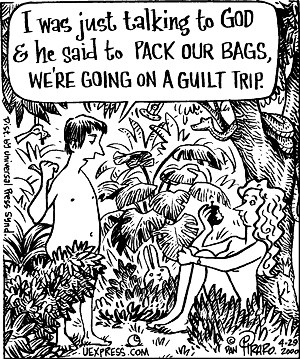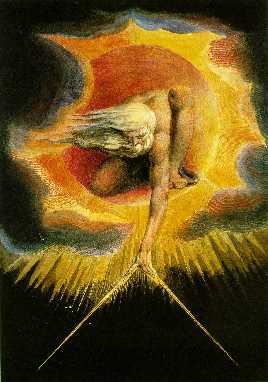 My prior post about Gen. 3 and how (and why) Eve and Adam realize that they are naked has generated a lot of excellent comments. Please do be sure to read them all. A number of comments are addressing the origin of evil and I wanted to remind folks of my earlier post from two weeks ago on this topic. I realize that my somewhat unorthodox reading may have been lost within the post since it is a sermon (short homily really) so I have re-presenting the cogent bits here.
My prior post about Gen. 3 and how (and why) Eve and Adam realize that they are naked has generated a lot of excellent comments. Please do be sure to read them all. A number of comments are addressing the origin of evil and I wanted to remind folks of my earlier post from two weeks ago on this topic. I realize that my somewhat unorthodox reading may have been lost within the post since it is a sermon (short homily really) so I have re-presenting the cogent bits here.
… In presenting Adam and Eve with the opportunity to demonstrate their love and obedience to him, God also created the opportunity for sin. Sin did not exist in the Garden prior to this moment but the potential did.
Gen. 3.1 Now the serpent was more crafty than any other wild animal that the LORD God had made. He said to the woman, “Did God say, ‘You shall not eat from any tree in the garden’?” 2 The woman said to the serpent, “We may eat of the fruit of the trees in the garden; 3 but God said, ‘You shall not eat of the fruit of the tree that is in the middle of the garden, nor shall you touch it, or you shall die.’” 4 But the serpent said to the woman, “You will not die; 5 for God knows that when you eat of it your eyes will be opened, and you will be like God, knowing good and evil.” 6 So when the woman saw that the tree was good for food, and that it was a delight to the eyes, and that the tree was to be desired to make one wise, she took of its fruit and ate; and she also gave some to her husband, who was with her, and he ate. 7 Then the eyes of both were opened, and they knew that they were naked; and they sewed fig leaves together and made loincloths for themselves.
We all know the story well, but consider two key points: the serpent does not (strictly speaking) lie and yet God seems to do so. The serpent craftily uses words to persuade Eve (and Adam “who was with her”) that when God said that they would die in the day that they ate the fruit that they would not, but rather they would “be like God, knowing good and evil.” After God discovers their transgression and curses the serpent, the woman, and the man, notice what he says.
Gen. 3.22 Then the LORD God said, “See, the man has become like one of us, knowing good and evil; and now, he might reach out his hand and take also from the tree of life, and eat, and live forever”— 23 therefore the LORD God sent him forth from the garden of Eden, to till the ground from which he was taken.
God confirms what the serpent said, they have indeed become like God, knowing good and evil,” but the man and the woman don’t die on that day! Clearly God is a liar!
Now many will justify God saying, “They do die ‘in that day’ because they may no longer eat of the tree of life and live forever.” But I think this misses the real point, the momentous event that occurred. In the moment that Eve and Adam ate of that fruit the potential for disobedience became the reality of sin. And in response the justice of God was meted out and so too was his mercy.
Just as the actions of the man and the woman brought about the reality of suffering and death into the world it also brought about God’s mercy and grace. So long as they were obedient, they could do anything in the Garden they liked! just not eat of that one tree, so long as they were obedient, God did not need to show mercy and grace. When tested we humans succumbed to temptation and when tested God responded with mercy.





17 thoughts on “Genesis of Evil”
One ancient interpreter actually had a brilliant resolution to the problem of Adam and Eve not dying on “that very day” built on Ps 90:4 and the ancient belief that one day is like a thousand years to God in heaven.
Adam died. . . and he lacked seventy years of one thousand years [that is?
he died at the age of 930]. One thousand years are as a single day in the testimony
of heaven; therefore it was written concerning the tree of knowledge,
“On the day that you eat of it? you will die.” Jubilees 4:29-30
So there you go: Adam died on that very day!
I don’t believe God lied at all. If God lies, He ceases to be God. Being omnipotent, omnicious, etc… means that He is eternally so, and if He ceases to be, He ceases to be God. So, no I do not believe that God lied.
One way to look at this is the same way we look at being born. In essence, we begin to die as soon as we are born. Our mortality begins immediately. Some of us can prolong this process well in to our 80s and 90s, but others of us die much sooner. So technically, in the very day Adam ate, he did begin to die. But the Lord prolonged his days long enough to populate the world. Which in his case I believe was something like 900 years 🙂
I think that approach is “special pleading” against the simple meaning of God’s warning to Adam. When I say God “lied” I am of course using strong language, but it is clear that God told Adam that he would do one thing (punish him with death “in the day that he ate of it”) and yet let him live. To change his mind is not really to say that God lied, rather than he had mercy. That is the point of my argument. Some might call it “lying” or “waffling” but I call it mercy and grace.
There is an applicable rabbinic dictum: When God promises to bless he will always bless, but when God promises to punish he may have mercy.
The point, if I am correct, is that a strictly literal reading implies that God did lie, but if we step back and read it less-than literal, then we can ‘get the message’. It is the same between the creation accounts in Genesis 1 and 2, which has received a great deal of commentary in trying to rectify the two. If you take it literally, there is too large a gap to over come.
If you could take the Bible literally, and there were no problems or discrepancies, then we might have an argument for the Bible being the “Word of God”. However, the Bible cannot be taken literally at all. If you try to, then it all just falls apart. We are left with a load of myths and fables and a bit of poetry. There is no objective evidence for the “Holy Writ” of scripture, much less for the existance of a god!
Just a couple of more thoughts on the subject: 🙂
God said, “for in the day that thou eatest thereof thou shalt surely die.” In 2 Peter 3:8 we read, “But, beloved, be not ignorant of this one thing, that one day is with the Lord as a thousand years, and a thousand years as one day.” If one day is as a thousand years, then God spoke truthfully because Adam did not live to be 1000. 🙂
We also have this teaching from the Book of Mormon, written by a father to his son about the importance of having an opposition between good and evil:
11 For it must needs be, that there is an opposition in all things. If not so, my first-born in the wilderness, righteousness could not be brought to pass, neither wickedness, neither holiness nor misery, neither good nor bad. Wherefore, all things must needs be a compound in one; wherefore, if it should be one body it must needs remain as dead, having no life neither death, nor corruption nor incorruption, happiness nor misery, neither sense nor insensibility.
12 Wherefore, it must needs have been created for a thing of naught; wherefore there would have been no purpose in the end of its creation. Wherefore, this thing must needs destroy the wisdom of God and his eternal purposes, and also the power, and the mercy, and the justice of God.
13 And if ye shall say there is no law, ye shall also say there is no sin. If ye shall say there is no sin, ye shall also say there is no righteousness. And if there be no righteousness there be no happiness. And if there be no righteousness nor happiness there be no punishment nor misery. And if these things are not there is no God. And if there is no God we are not, neither the earth; for there could have been no creation of things, neither to act nor to be acted upon; wherefore, all things must have vanished away.
14 And now, my sons, I speak unto you these things for your profit and learning; for there is a God, and he hath created all things, both the heavens and the earth, and all things that in them are, both things to act and things to be acted upon.
15 And to bring about his eternal purposes in the end of man, after he had created our first parents, and the beasts of the field and the fowls of the air, and in fine, all things which are created, it must needs be that there was an opposition; even the forbidden fruit in opposition to the tree of life; the one being sweet and the other bitter.
16 Wherefore, the Lord God gave unto man that he should act for himself. Wherefore, man could not act for himself save it should be that he was enticed by the one or the other.” 2 Nephi 2:11-15
Whatever God said turned out to be not true. To say that is not “a lie” is to stretch the boundaries of language, which of course is par for the course with biblical studies.
Once again, this point illustrates the point I made in the last post about Segal’s reading. We assume God is always the good guy, but maybe the text is more nuanced in that regard. Maybe the idea is that this god character is capricious and easily angered for no good reason.
After all, what Adam and Eve did wasn’t a “sin” in any moral sense. Eating a piece of fruit doesn’t hurt anybody. It was only wrong because the god character decided arbitrarily that eating that particular piece of fruit was wrong.
And how did the fruit provide moral consciousness? Unless it had some unique ingredients that have been lost to mankind, it had no physical properties that would alter a human’s mind and give them moral consciousness.
Of course, all these things (and the talking snake) should be clues to a rational person that it is a myth and not an actual event.
I don’t think that is stretching the boundaries of language at all, simply consider every day life. pf, have you never said to someone “I will be at such and such a place and this particular time” and then not been able to show up at that time? Would it be fair to say that you are a liar? Or how many people have said, “If so-and-so does that one more time I am going to kill them!” Surely they are not “lying” when they do not kill the person who continues to perform the annoying act. And I could go on and on.
What Adam and Eve as a sin since they disobeyed God, the fundamental definition of sin. Just because the knowledge of good and evil did not yet exist for them does not mean that morality did not exist. Understanding this is what allows us to understand how the taking of the fruit (not the fruit itself) provided “moral consciousness.” Once they took it they know what it meant to disobey God, to do evil. The contrast was now present: Good is obeying God and evil is disobeying God.
Finally, the debate about the definition of “myth” has raged in the biblioblogging world before and I will not try and engage in it here. I will say, however, that on some level I agree with you, we have to read this not as a NY Times account of an historical event, but as “a story containing truth,” which is one very good definition of myth.
Chris, I have been late, but that’s not what we’re talking about here, is it?
God said if you eat this, you will die, knowing full well that they wouldn’t. The snake told Eeve that she would be like god, in other words, increase her consciousness, and in fact that is what happened.
All this gets us is to say that sin is disobeying god because disobeying god is a sin. That might be satisfying to the believer, but it makes no logical sense. And god’s alleged definition of sin is a moving target. In this case, eating a fig caused all sorts of repurcussions, while in other cases killing masses of people was seen as just.
In many respects, disobeying god is often more moral than obeying him.
Just a note on sin. You are right that this definition is only satisfying to a believer and that is because there is no sin without the religious framework. If one is an atheist there is no sin. There can be immorality and doing wrong, but it would not be sin. In the context of Gen. 2-3 sin is not a moving target, there was one and only one way that they could disobey God (and does one even have to define that is “sin” to recognize that they weren’t to do it?).
Why did it bother god that humans gained knowledge of good and evil? Why wasn’t he happy that his creation had gained moral knowledge? Why didn’t he want them to live forever?
If a human acted that way, we’d say he was petty and jealous.
What’s more, if Adam and Eve didn’t know right or wrong (or “sin”) until they ate of the fruit, how did they know beforehand it was wrong to eat it? You can’t know it is wrong to eat fruit unless, well, you have knowledge of good and evil.
The story doesn’t make sense on any level, except as an ancient myth by people who were trying to understand why the world was so inhospitable. They thought they had offended a deity.
Did God intend to share the fruit of the Tree of Life but thought it unwise once Adam and Eve had “become like us?” Allowing humans to live for ever if they are not susceptible to pride and ambition may seem a reasonable state of affairs but once they knew their potential, eternal life became unacceptable.
Scott – God never disallowed them to eat of the Tree of Life, according to the narrative, but apparently they had not yet eaten of it. I certainly agree with the line of commentary that suggests God is motivated by mercy in not allowing humanity to live forever with our knowledge and limitations. (And The Twilight Zone agrees as well.)
Its all a load of rubbish. If you take Genesis or the rest of the Bible seriously, you are sadly deluded. Instead of expending your energies and intellect on ancient myths, why not spend your time fruitfully – perhaps doing science? By the way – there is no such thing as “Creation Science” – we are not fooled!